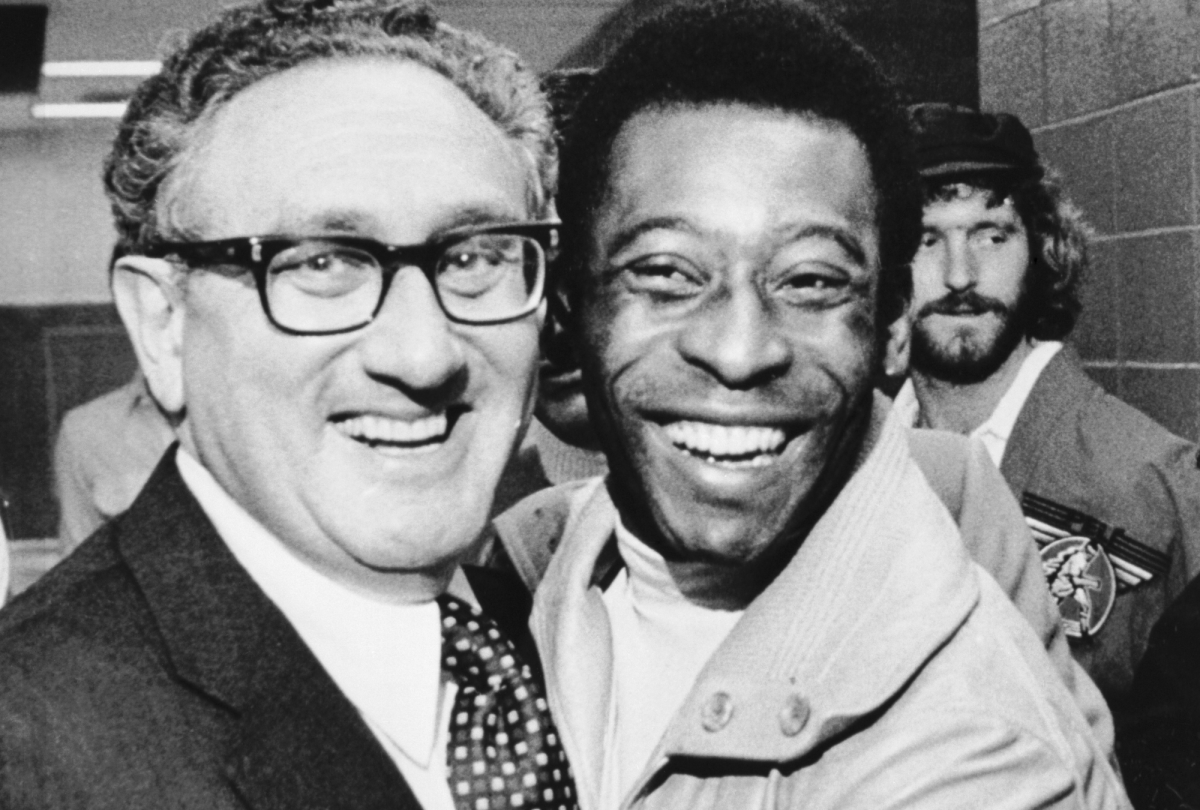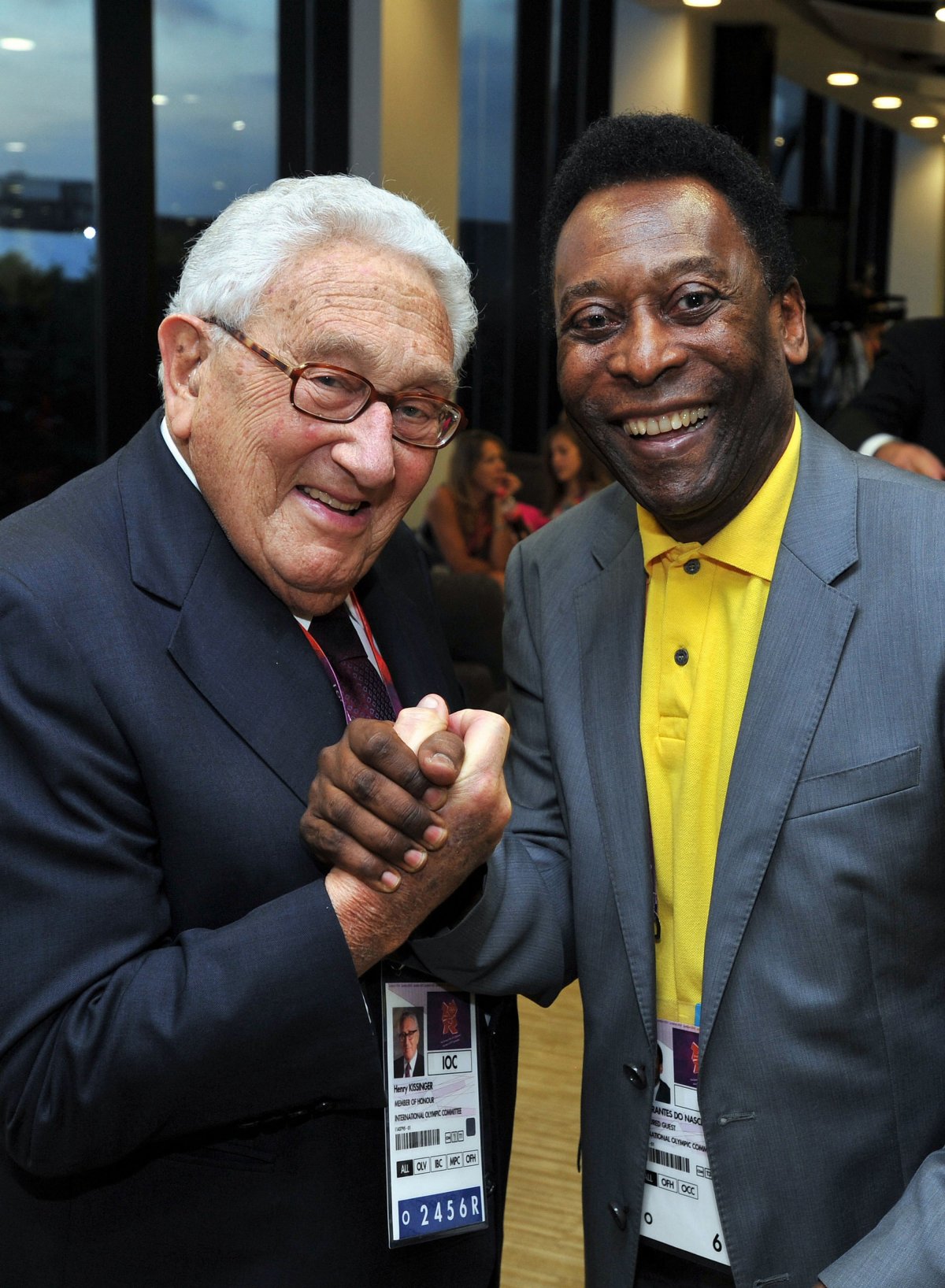Former U.S. Secretary of State Henry Kissinger might be predominantly known as a noted diplomat, but he was also an avid soccer lover, even traveling to Brazil to entice superstar Pelé out of retirement.
The former national security adviser and Nobel Peace Prize laureate died on Wednesday at his home in Connecticut at the age of 100.
In addition to his high-profile, high-controversy political career, Kissinger was also a soccer superfan who wrote an essay for Newsweek in 2006 analyzing the greatness of the 1970 Brazilian team's corner kick. His deep love of the game started in Germany, he said, where he was born on May 27, 1923, in Fürth. "I have not lived in Germany for many more decades than I care to admit, yet I still follow the fortunes of that team which, in the age of high-salary professionalism, has been relegated to the second division," he wrote.
He compared soccer to ballet in its beauty and elegance, noting that "teams that concentrate on individual skills, like the Brazilians, astonish with their virtuosity and abandon. On the other hand, they sometimes are so infatuated by their individual artistry that they forget to score goals and are overcome by more single-minded, strategically oriented teams."
Still, he referred to soccer legend Pelé as "incomparable."

Pelé, born Edson Arantes do Nascimento, died at the age of 82 last year. He has been called the greatest soccer player in history, even by the sport's international governing body FIFA. Pelé, who played for Brazilian club Santos from 1956 to 1974, was one of the most popular athletes of the 20th century, leading his home country of Brazil to World Cup titles in 1958, 1962 and 1970.
In a May 2016 interview with Esquire, Pelé said Kissinger changed his life by persuading him to move to the U.S. to play for the New York Cosmos. He ultimately played 64 North American Soccer League games for the team in 1975, 1976 and 1977, according to the Society for American Soccer History (SASH).
"It was a bit difficult to decide to go, because I had retired from the national team of Brazil and I had decided I would retire with Santos," Pelé told Esquire. "I had offers to go to Italy and Spain, but I said, 'No, I'm just going to retire.' But then Mr. Kissinger came to Sao Paulo."
In the Esquire interview, the soccer star recalled the meeting with Kissinger that sparked him to come out of retirement and move to a new country.
"He invited me to go to the cafe with him, and there he said, 'Listen, you know I'm from the United States, and I'm in politics there. Soccer is coming along there—they're playing it in the schools. Would you like to help us promote soccer in the United States?' And I said, 'my God!'" Pelé said.
"I accepted—I said I would go for a year," he continued. "But I worried a little bit, because the level of play there was not that high yet. But then, once we started to promote it, it became very interesting. They brought over [Franz] Beckenbauer, and [Johan] Cruyff, and Giorio Chinaglia. That's when I said, 'Wow, this is great,' and I agreed to play three more years. It kept going, they started playing in colleges, and it moved forward."

Pelé said, at the time, he was concerned that he didn't speak English well enough and didn't have time to learn.
"When I came to the U.S., for the Cosmos, I studied English for four years and that was important for my life," he said.
Kissinger, who attended numerous World Cup finals, been recruited by the U.S. Soccer Federation to help lobby for the United States to host the 2018 or 2022 World Cup, Reuters reported in 2009.
""I obviously want the World Cup to come here," he said at the time, adding that he thought the U.S. had a "good chance to host in 2022. "I'll be 99 years old [in 2022], so it's sort of an obligation to stay around."
While Qatar hosted the World Cup in 2022, the next World Cup in 2026 will be played across the U.S., Canada and Mexico.
David Kilpatrick, the club historian of the New York Cosmos, told Newsweek in an email interview on Thursday that Kissinger was vital in convincing the Brazilian government to agree to let Pelé for an American team.
"Pelé was identified as a national treasure by the Brazilian government so it took the intervention of Kissinger as Secretary of State to convince the nation to release him to play in the United States, as his joining the New York Cosmos in 1975 would strengthen relations between our nations," Kilpatrick said.
He told Newsweek that getting Pelé was "essential" in growing the sport's popularity in the U.S.
"Soccer was struggling for attention here so bringing the world's greatest player at the world's favorite sport was seen as essential for marketing the fledgling North American Soccer League, desperate to be viewed as a major league along with the more established sports of baseball, football, and basketball," Kilpatrick said.
The deal to bring Pelé to the U.S. was so successful that participation "skyrocketed" for several years following, Kilpatrick said.
"The arrival of Pelé literally changed the landscape of the country as where there were only baseball diamonds in every town in America now there are also soccer fields," he said.
Participation numbers skyrocketed among kids who would later be identified as GenX."
Kissinger was a "frequent visitor" of the Cosmos locker room, attending numerous games, Kilpatrick said, noting "especially when Franz Beckenbauer (Germany's greatest player) joined for Pelé's last season in 1977."
He said Kissinger even held the honorary title of chairman of the board of directors for the North American Soccer League and highlighted the former secretary of state's involvement in efforts to help the U.S. host the FIFA World Cup Finals.
"He was a lifelong soccer fanatic who understood the utility of sport for diplomacy," Kilpatrick said.
Update 12/2/2023, 10:50 p.m. ET: This article was updated with comment from Kilpatrick.
Uncommon Knowledge
Newsweek is committed to challenging conventional wisdom and finding connections in the search for common ground.
Newsweek is committed to challenging conventional wisdom and finding connections in the search for common ground.
About the writer
Maura Zurick is the Newsweek Weekend Night Editor based in Cleveland, Ohio. Her focus is reporting on U.S. national news ... Read more
To read how Newsweek uses AI as a newsroom tool, Click here.








